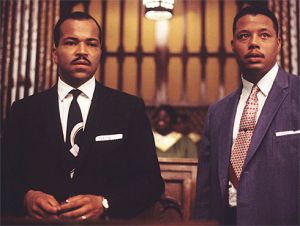Boycott (2001)
Boycott was released on February 24, 2001, in the USA. The American film was produced by CBS, Chotzen/Jenner Productions, and Come Sunday. The film was written by Herman Daniel Farrell and directed by Clark Johnson. The movie was based on Stewart Burns's book named " Daybreak of Freedom" which displaying how African Americans boycott public buses in Montgomery in the 1950s[1].
Plot
In 1955, Rosa Parks, an African American woman, would not give her seat to a white passenger who just entered the bus. She believes that she has the right to sit in the "colored" section. However, she is arrested by police and going to pa prison. This incident has caused a spark of the desegregation movement in Montgomery, Alabama. As the situation goes worse, the African Americans decided to boycott the public buses of Montgomery. Moreover, they would establish a Montgomery Improvement Association (MIA). Martin Luther King (Jeffrey Wright) is selected by activists to lead the rights movement. The civil rights struggle goes further which creates despair for African Americans as they are threatened and harassed by many white segregationists. Some African Americans would fight back violently, King is fearful as the situation goes worse and his father told him to withdraw from Montgomery. However, Bayard Rustin (Erik Todd Dellums) encourage King and others to keep the boycott nonviolently as their actions could be an example for the civil rights movement across the country. King aspires to attain equal civil rights for African Americans despite the bomb he got which burnt his house down to ashes. Still, he gets supported by the believer in civil rights especially his wife, Coretta. In the end, the Montgomery bus boycott becomes the initial black movement where it becomes an example across the country to fight racism nonviolently and desegregates the discriminatory law in the Supreme Court[2].
Black Empowerment

Many local activists support what Rosa Parks does in refusing to give her seat for white passengers. These activists form the MIA to break the segregation occurrence in Montgomery. King, who leads the campaign has aspired many African Americans to fight for their rights nonviolently. His campaign through bus boycott becomes a compromise method to seed the revolution of civil rights for African Americans. Many African Americans would tell their relatives and colleagues to join the campaign. This action has gathered many supporters from all over Montgomery and create public attention, especially for the government. The MIA also fight racism legally by confronting the 14th Amendment's right where it should also provide equal protection in public facilities. Finally, on November 13, 1956, the high court agreed with the argument and amended the law which made the segregation was unconstitutional on Montgomery's public facilities. Eventually, African Americans could have a seat wherever they want and resume riding public buses[4]
Controversy
The situation at the time was fearful. As shown in the film, each activist has risks while fighting racism. Dr. King was afraid that his family could go into danger and the safety could not be assured. For that reason, Dr. King had to carry a gun beneath his belt when he went outside. The white segregationists would not hesitate to express their hatred towards African Americans including the scene where Rosa Parks was imprisoned due to refusing to give up her seat for a white passenger who just entered the bus. Also, it is shown where African American teenagers were arrested brutally while they were innocent before the Rosa Parks imprisonment scene. Furthermore, several people would not help African Americans for example when the house of King was burnt to ashes, the firemen only stood by and did nothing to save the house[5].
References
- ↑ Boycott (2001). IMDb. Retrieved January 23 2021
- ↑ Tom Wiener. Boycott (2001) AllMovie. Retrieved January 23 2021]
- ↑ KingAide. Visual Parables. Retrieved January 23 2021
- ↑ Kristal Brent Zook. Getting To the Heart of 'Boycott' The Washington Post. Retrieved January 23 2021]
- ↑ Ed Mcnulty. Boycott (2001) Visual Parables. Retrieved January 23 2021]